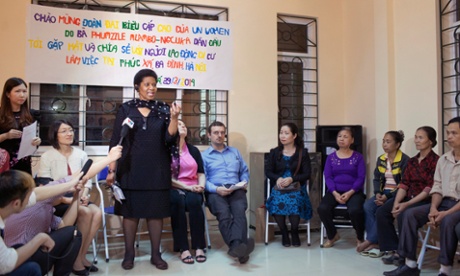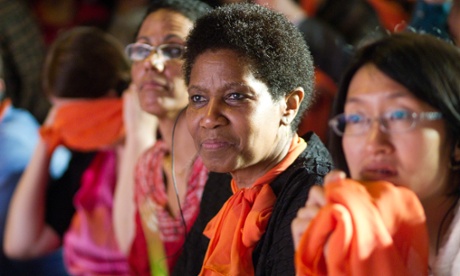Human Rights of Women
Source: The Guardian
Phumzile Mlambo-Ngcuka was appointed United Nations under-secretary-general and executive director of UN Women in August 2013. As a South African government minister and deputy president, she led programmes to combat poverty and share the benefits of economic growth, with a particular focus on women. Actively involved in civil society and the struggle to end apartheid, she is a longtime champion of social justice, women’s rights, and gender equality.
Women’s Economic Empowerment is one of UN Women’s four strategic pillars, and you’ve made it clear that this is a priority for you as Executive Director. Why is this so important?
Women’s economic empowerment is absolutely essential to gender equality. It’s a matter of basic fairness that women are able to fully and equally participate in the economy. With a livelihood and an income of their own, women have increased status, can provide for their families, and become empowered in other parts of their lives as well, such as making decisions about education, housing, food choices, and medical care. That’s why women and the economy was included as a strategic objective in the Beijing Declaration and Platform for Action, the road map to gender equality adopted by 189 governments almost 20 years ago.
There’s hard evidence that gender equality and women’s empowerment are powerful drivers of economic growth and national income. For example, a recent IMF study found that gender equality in labour participation rates would have a strong positive impact on GDP growth. Other studies have shown that Fortune 500 companies with the most women managers have shareholder returns 34% higher than those with the fewest women managers. Goldman Sachs researchers found that if women’s paid employment rates were raised to the same level as men’s in 15 major developing economies, income per capita would rise by 14% by 2020, and 20% by 2030. It’s important to say though, that not all work is equally empowering. Working conditions matter. So does the type of work that women do.
Achieving women’s economic empowerment is not a quick fix, but will take sound policies and a long term commitment from a variety of stakeholders. What are some of the strategies that UN Women has identified to promote more inclusive growth for women?
The first step toward increasing inclusion is reducing exclusion. Some 800 million women worldwide are kept out of the labour force due to a range of factors including discrimination and a lack of access to education and training. It’s hard to believe in 2014, but a recent World Bank study of 143 economies found that 128 still have at least one legal difference in how men and women are treated. That includes laws that make it impossible for a woman to independently obtain an ID card, to own or use property, to access credit or to get a job. And we know that around the world, women continue to earn less than men for work of equal value.
The good news is that there are clear solutions. We must legislate to remove barriers to equal opportunities in education and the economy, and at the same time, we must implement existing laws. We have witnessed that laws such as those mandating equal pay for equal work are not enough in themselves – we have to ensure that those commitments are backed by real action. We also need to tackle women’s immense burden of unpaid care work – as well as time-consuming household tasks like collecting water and fuel. Other essential strategies are to ensure that women and girls have equal access to education and training, as well as to productive resources like land and credit. These are important strategies in their own right. They also have powerful compounding effects as women’s status and independence grow.
Accomplishing these changes is going to take work by many sectors and partners: our natural partners in the women’s movement and civil society, extended to new constituencies, including young people, men and boys, religious leaders, cultural and traditional authorities, the military and the private sector.

What role do you see the private sector playing in this effort?
The private sector can provide vital leadership here. One billion women are set to enter the global economy in the next decade – they constitute both a powerful new economic force and an emerging market comparable to India or China. This is a massive opportunity for businesses that are committed to empowering women, that offer family-friendly work practices, promote more women, and that look for ways to include and engage them. When it comes to finance, it is estimated that up to 70% of formal small and medium-sized enterprises owned by women in the developing world are unserved or underserved by financial institutions. This represents a financing gap of $285bn and a significant opportunity for the sector.
UN Women, along with multi-stakeholder platforms like the Business Call to Action and the UN Global Compact, stands ready to work with you. One place to start is with our Women’s Empowerment Principles. I would encourage all business leaders to get a copy from our website, sign up to the statement of support, and work with us to implement the principles.
Can you tell us a bit more about UN Women’s new Private Sector Leadership Advisory Council, launched in June?
My experience as minister for minerals and energy in South Africa showed me the importance of making connections between policymakers and business leaders. Sustainable results for women’s economic empowerment can only be achieved if we work together as allies and partners. I was very proud to launch the UN Women Private Sector Leadership Advisory Council in June this year. The council’s focus is to accelerate economic and social progress for women and girls worldwide by combining the expertise, reach and resources of UN Women and the private sector – advising one another as we seek greater results in improving women’s lives and livelihoods. We are already working with some of these companies, so it seemed like a natural next step to turn our collective capacity to some of our key priorities – and toughest challenges.

UN Women is also working hard to strengthen the ICT agenda. Can you talk about the critical gaps in women’s education and the digital divide and how this contributes to inequity?
The potential for technology education to empower women is an area close to my heart. I’ve worked as a teacher and recently finished my PhD in education and technology, and I’m very concerned by the ‘digital divide’ in access to the internet between boys and girls, men and women.
It has been estimated that, without action, the digital gender gap could affect 350 million women in three years time. A recent report from Intel, “Women and the Web” found that across the developing world, nearly 25% fewer women than men have access to the internet on average, and that the gender gap is nearly 45% in regions like sub-Saharan Africa.
The jobs of the future – and many of those in the present – will require some level of digital literacy. We must ensure that women and girls aren’t locked out of the online economy.
What sort of work are you doing in this area?
At the programming level on the ground, we have too many initiatives for me to list! We are running digital literacy programmes in countries including Guatemala and Afghanistan, and we are supporting mobile payment and information systems for women in small business in Papua New Guinea and East Africa. UN Women has also been supporting the development of mobile apps and games to raise awareness of violence against women and support survivors in Brazil and South Africa. I must also mention that right now, UN Women is partnering with theInternational Telecommunications Union to launch a new global technology award that recognises outstanding contributions from women and men in leveraging the potential of information technology to promote gender equality.
How will your work with the private sector strengthen this facet of development?
The private sector can play a defining role in women’s digital empowerment and full participation in the information society. They can make a critical impact in terms of the access they provide to infrastructure, skill and content development, and in attracting and promoting women within ICT businesses and workforces. We have developed some very exciting partnerships in ICT businesses, from our work with CISCO to promote women’s entry into ICT networking academies, to the provision of ICT training resources with Microsoft through our Knowledge Gateway for Women’s Economic Empowerment. We are also partnering with Intel on the She Will Connect initiative, a project that aims to get 5 million women online over the next three years in Kenya, Nigeria, and South Africa.
UN Women has a significant focus on violence against women. How are you working with the private sector in this area?
Violence against women is a global pandemic. Around one in three women will experience violence in her lifetime, in all regions of the world. This violence tears apart lives, families, and communities. We definitely need the private sector to be engaged in our effort to eliminate it and to ensure that every woman and girl can live free from the fear of violence.
Under UN Women’s Safe Cities Global Initiative, supported by Microsoft, women and girls in cities including New Delhi, Marrakesh and Rio de Janeiro have been working to identify and report threats, and map and document safety risks, ranging from faulty infrastructure to dark footpaths. In Port Moresby, Papua New Guinea, we are working with a local bank, Bank South Pacific, to improve the safety of women market vendors and their children, building new libraries and upgrading infrastructure.
What comes next?
Next year, the Millennium Development Goals will expire, and a new set of Sustainable Development Goals will establish a new agenda for global development. We know from the experience of the MDGs that broader progress is just not going to be possible without gender equality and women’s empowerment. Through the new agenda we want to demolish the major barriers holding back women and girls from achieving their potential and release that force for growth and change into the world’s economies and societies. This is a huge task, which is why UN Women is galvanising a new global movement towards empowerment to take this on.
